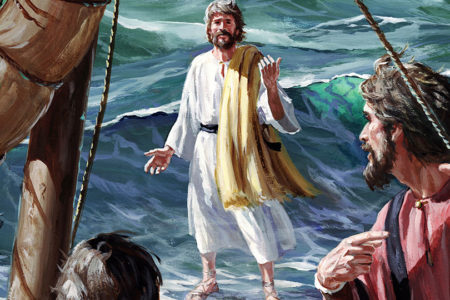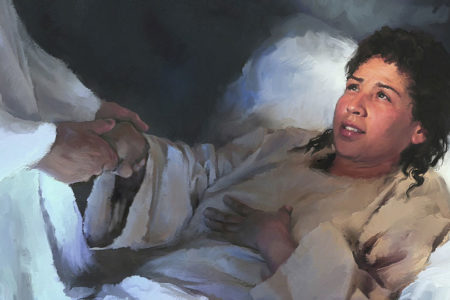Spiritual Discernment
1 John 4:1–6
First-century believers were often inundated with heretical doctrine from people whom the Bible identifies as false teachers and false prophets.
At that time, there was no completed New Testament or a systematic theology to guide Christians away from error. Biblical doctrine was generally communicated orally by the apostles, elders, or other spokesmen within the church; and it was easy for unscrupulous false teachers to enter the fellowships, capture people’s hearts, and mislead believers. Therefore, it was necessary for Christians to acquire spiritual discernment to know whether they were hearing truth or error.
In 1 John 4:1–6, the apostle John gave believers guidelines so they could determine if a teacher was providing truth from God or lies from Satan.
Command to Test Spirits
John commanded Christians to test the spirits to see if they were from God: “Beloved, do not believe every spirit, but test [examine] the spirits, whether they are of God; because many false prophets have gone out into the world” (v. 1).
Again, John expressed affection by calling his readers “Beloved” before issuing a strong warning against false teachers. The word spirit refers to the demonic spirit behind the lies of these false prophets. Believers should rely on the indwelling Holy Spirit in discerning whether someone is a false teacher.
They must “test the spirits” to determine if a teacher’s message is truly a revelation from God. The word test connotes a metallurgist who carefully examines a metal or coin to determine its authenticity, full weight, purity, and worth. The word is in the present tense, indicating a Christian should continually be evaluating every speaker’s words before embracing the message.
Jesus and the apostles Peter and Paul constantly warned the church to guard against false prophets (Mt. 7:15; 24:11; Acts 20:28–30; 2 Pet. 2:1).
The words false prophets could refer to men who falsely claim to be prophets, but most likely they mean individuals who speak falsely concerning Christ: They tell lies inspired by demonic spirits and claim their message is from God.
These anti-Christian teachers were mentioned in 1 John 2:18–19. Today they primarily would be teachers from cultic and occult groups propagating nonscriptural views of Jesus Christ.
Often Christians believe a speaker because of his or her position, credentials, authoritative tone, or acceptability in Christian circles. Yet it is mandatory that believers evaluate a speaker’s theology and teaching in light of God’s Word to discern whether he is from God.
Criterion for Testing Spirits
John provided the criteria every Christian should use to test the spirits:
By this you know the Spirit of God: Every spirit that confesses that Jesus Christ has come in the flesh is of God, and every spirit that does not confess that Jesus Christ has come in the flesh is not of God. And this is the spirit of the Antichrist, which you have heard was coming, and is now already in the world (4:2–3).
In other words, where a teacher stands on Jesus’ divinity as the eternal Son of God who became a man is the conclusive test for whether he or she is a false teacher.
Belief in Christ’s incarnation is indispensable for true teachers. In fact, it is the doctrine by which all else within Christianity stands or falls (cf. 1:1–3). All teachers who are from God must believe and proclaim that Jesus Christ is God in human flesh.
All who refuse to “confess that Jesus Christ has come in the flesh” possess “the spirit of the Antichrist” (4:3). There is no in-between. One who does not believe in or tries to diminish Christ’s deity or humanity is condemned as heretical and denounced as anti-Christian. John boldly declared that anyone who deviates from what he has taught is considered to possess the spirit of “Antichrist, which you [Christians in John’s day] have heard was coming, and is now already in the world” (v. 3).
If the apostle were here today, he would denounce heresies like the following:
- Gnosticism, which taught Jesus did not have a human form.
- Marcionism, which taught Christ did not come in a physical body.
- Cerinthianism, which denied Jesus’ divinity.
- Docetism, which taught Jesus only seemed to be human.
- Ebionitism, which taught Jesus was the Messiah but not divine.
- Monarchianism, which claimed Jesus was among the greatest of all men but was not divine.
- Arianism, which taught Christ did not always exist but was created and was therefore subordinate to God the Father.
- Apollinarianism, which said Christ was divine but not human.
- Nestorianism, which claimed there is no union between the human and divine natures of Jesus Christ.
- Eutychianism, which taught Christ had only one nature that was neither undeniably human nor undeniably divine.
Throughout the centuries, myriads of heresies would develop that deny either the humanity or deity of Jesus Christ.
Christianity’s True Spirits
John reassured his readers and praised them for not yielding to the spirits speaking through pseudo prophets: “You are of God, little children, and have overcome them, because He who is in you is greater than he who is in the world” (v. 4).
Again, the apostle spoke tenderly, addressing his readers as “little children” in the family of God and acknowledging their faith. John praised them for not succumbing to false teachers and expressed confidence that they would not be fooled. He also reminded them of the divine power they possessed through Jesus Christ––power administered by the indwelling Holy Spirit who strengthened them to overcome satanic lies and be victorious over false teachers.
The phrase have overcome is in the perfect tense, meaning that at a particular point, John’s readers recognized certain teachers were satanically motivated; and they continued to reject them as false teachers, remaining victorious over them.
These Christians overcame false teachers “because He who [was] in [them] is greater than he who is in the world.” John did not reveal to whom this phrase refers. Four interpretations are possible:
- God the Father (3:2).
- God the Father working through Christ (2:14; 3:1).
- God the Father and Son working through the Holy Spirit.
- The indwelling Holy Spirit alone. All these teachings are true in countering the Devil and his evil world system.
Through His death on the cross, Christ disarmed, defeated, dethroned, destroyed, and doomed the Devil (cf. Heb. 2:14). However, God uses the indwelling Holy Spirit in the lives of believers to endow, equip, strengthen, teach, and lead them to victory over the Devil’s power and false teachers (cf. Jn. 14:16–17; 1 Jn. 2:27; 3:24; 4:2).
The word world refers to the invisible, evil, spiritual world system the Devil governs. He corrupts humanity’s values, attitudes, thoughts, and practices, leading people to rebel against the true and living God of Scripture; thus they oppose His plans.
John said false teachers, false prophets, and all their followers “are of the world. Therefore they speak as of the world, and the world hears them” (1 Jn. 4:5).
There is a marked distinction between false teachers and teachers from God. False teachers derive their beliefs and messages from the philosophy of this godless, Christ-rejecting world. Often they twist Scripture to make it say what it does not mean. Yet their teachings, viewpoints, and persuasive arguments seem logical to unbelievers, who “hear” and accept their message because it stimulates them to listen. Cults attract followers because their messages, no matter how far from the truth, appeal to the world’s ungodly desires and ambitions.
In contrast, God’s teachers draw their messages from the truth of Scripture. To the ungodly of this world, what they say often makes no sense. To them, preaching Christ as the God-Man who was crucified for the sins of humankind seems ridiculous. The message of faith in Christ as the only way to heaven is considered crude, offensive, a stumbling block, and foolishness (1 Cor. 1:18–31). Satan, the god of this age, has blinded the minds of those who do not believe (2 Cor. 4:4).
Today many cults rip Scripture from its context, twist it into saying what they want, and use it to justify their ungodly, detestable, unscriptural teaching.
John explained the source of their messages: “We are of God. He who knows God hears us; he who is not of God does not hear us. By this we know the spirit of truth and the spirit of error” (1 Jn. 4:6).
The word we refers to John and the other apostles who first proclaimed the true gospel given by Christ through the Holy Spirit (Jn. 14:26).
John said the one who “knows God hears us” (1 Jn. 4:6). That is, someone who has experienced the new birth responds to the Christian message. However, “He who is not of God does not hear us,” meaning someone who has never been born again refuses to listen to the truth about Christ.
John closed this section with a summary: “By this we know the spirit of truth and the spirit of error” (v. 6). The phrase we know means that all true believers, not merely the apostles, receive the discernment both to recognize and differentiate between the spirit of truth and the spirit of error. The “spirit of truth” is the Holy Spirit (Jn. 14:17; 15:26; 16:13). He does not dispense truth only when it is needed; His nature is the personification of truth, and He guides the godly teachers and controls what they believe and proclaim.
But “the spirit of error” (1 Jn. 4:6) refers to the realm of the Devil. By his very nature he is evil and actively uses deception to promote evil and error. Guided and controlled by the Devil, false teachers use all types of deceptions to persuade people to follow them.
Christian friend, you are in an ongoing war with false teachers trying to guide and control what you believe. Ask the Lord for discernment (1 Cor. 12:10). It is imperative that you understand and interpret God’s Word correctly and that you acquire spiritual discernment to recognize error and be guided and controlled by the Holy Spirit.







